At its heart, SEO (Search Engine Optimization) developed as an extension to web accessibility by following HTML 4 guidelines, in order to b...
At its heart, SEO (Search Engine Optimization) developed as an extension to web accessibility by following HTML 4 guidelines, in order to better identify the purpose and content of a document.
This meant ensuring that web pages had unique page titles that properly reflected their content, as well as keyword headings to be better highlight the content of individual pages, and that other tags were treated the same accordingly.
This was necessary, not least because web developers were often only focused on whether their coding worked, rather than the user experience, let alone following web publishing guidelines.
This slowly changed as it became increasingly known that search engines used these "on-page" signals to provide their "Search Engine Results Pages" (SERPs) - and that there was an advantage to ranking higher on these to tap into free and natural organic traffic.
- Here are the best web hosting services that we have curated
- Find the best website builder software
- We have shortlisted the best onpage SEO tools
The internet has evolved a lot since those early days, and major search engines such as Google now process far more "off page" information when determining their search results, not least by using semantic processing, collating user data, and applying neural networks for the machine learning of patterns, trends, and personal preferences.
Even still, the core ideals of SEO remain the same as they always have - that of ensuring pages have the correct tags for targeting keywords, not just for natural search results, but also for PPC (Pay Per Click) and other marketing campaigns, where call-to-action (CTA) and conversion rates are essential indicators of success.
But how does a business know which keywords to target on its sales pages? How does a website filter transactional traffic from general site visitors? And how can that business increase its ability to capture targeted traffic from across the internet? Here we list a number of tools that will help do exactly that.
Best SEO tools - at a glance
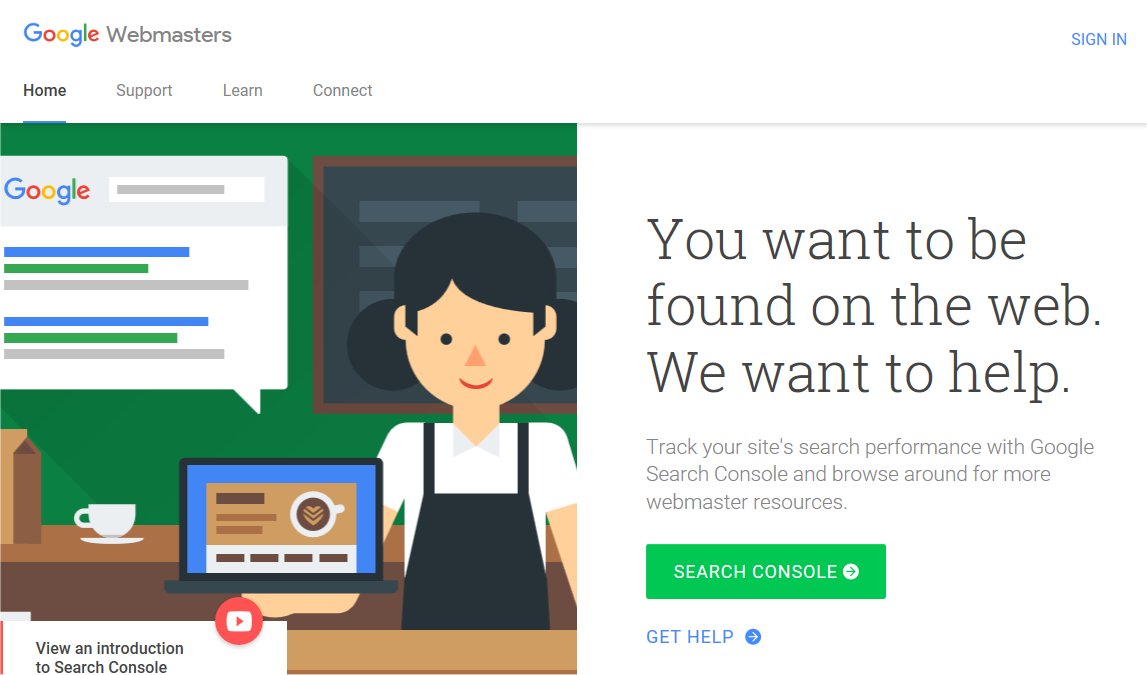
1. Google Search Console
Who better than the search giant Google to improve your SEO?
Google Search Console (GSC) is an excellent way for newbie webmasters to get started with SEO.
Even if you're not headstrong on SEO, whatever the size of your site or blog, Google's laudable Search Console (formerly Webmaster Central) and the myriad user-friendly tools under its bonnet should be your first port of call.
The suite of tools gives you valuable information about your site at a glance: it can assess your site's performance and observe potential problems to troubleshoot (like negative spammy links), help you ensure your site is Google-friendly and monitor Google's indexing of your site.
You can even report spam and request reconsideration if your site has incurred a penalty. Plus, if you don't refer to their Webmaster Guidelines now and again, well, you've only yourself to blame if you go wrong. Search Console is constantly updated, and new features are on the way, such as new URL inspection tool or the new sitemaps report.
Help is available via the Webmasters Help Community, a place for webmaster's to connect and share troubleshooting and performance tips. Towards the end of 2020, Google has migrated its disavow link tool to Search Console and has also updated its Outdated Content ool.
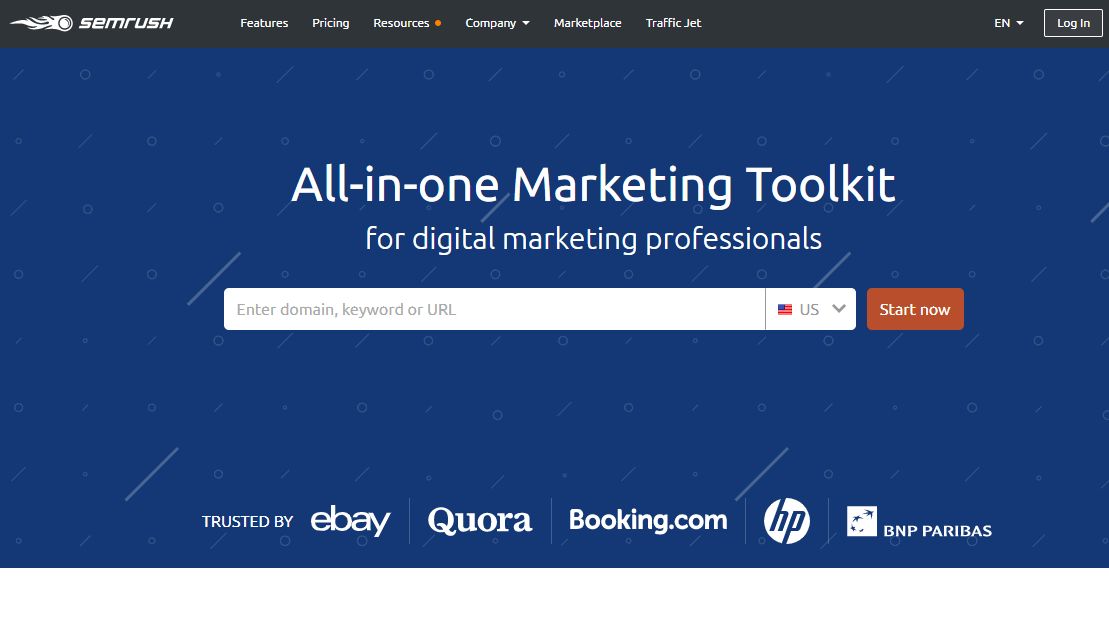
2. SEMrush SEO toolkit
Advanced SEO tools, all accessible from a masterful dashboard
SEMrush SEO toolkit was originally developed in 2008 by SEMrush. In 2018, the project received funding of $40 million for expansion.
The keyword research tool is accessible from SEMrush's super elaborate dashboard. You can view detailed keyword analysis reports as well as a summary of any domains you manage.
More crucially, the SEO toolkit allows you to compare the performance of your pages to see how you rank against the competition. For instance, you can analyze backlinks from other websites to yours. (this process is sometimes as 'link building').
Traffic analytics helps to identify your competitors' principle sources of web traffics, such as the top referring sites. This enables you to drill down to the fine details of how both your and your competitors' sites measure up in terms of average session duration and bounce rates. Additionally, "Traffic Sources Comparison" gives you an overview of digital marketing channels for a bunch of rivals at once. For those new to SEO slang 'bounce rates' are the percentage of visitors who visit a website then leave without accessing any other pages on the same site.
The domain overview does much more than provide a summation of your competitors' SEO strategies. You can also detect specific keywords they've targeted as well as access the relative performance of your domains on both desktop and mobile devices.
SEMrush has received many positive mentions online but has been critiqued for use of SEO jargon such as 'SERP' which may alienate inexperienced users. A 'Pro' subscription costs $99.95 per month which includes access to all SEO tools.
Over time, SEMrush added a few more tools to its offerings: a writer marketplace, a traffic-boosting tool, a tool set for agencies and even a white-glove service for PR agencies.
A 14-day free trial is available for Techradar readers to try out the service.
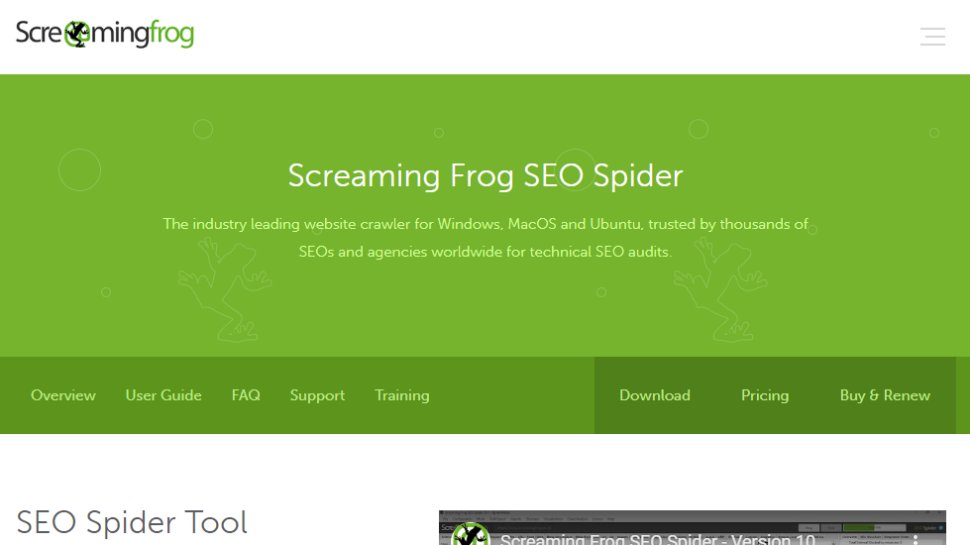
3. SEO Spider
SEO Spider is an effective web crawler but the free version is slightly limited
SEO Spider was originally created in 2010 by the euphemistically named "Screaming Frog". This rowdy reptile's clients include major players like Disney, Shazam and Dell.
One of the most attractive feature of SEO Spider is its ability to perform a quick search of URL's, as well as crawl your site to check for broken pages. This saves you the trouble of manually clicking each link to rule out '404 errors'.
The tool also allows you to check for pages with missing title tags, duplicated meta tags, tags of the wrong length, as well as check the number of links placed on each page
There is both a free and paid version of SEO Spider. The free version contains most basic features such as crawling redirects but this is limited to 500 URLs. This makes the 'Lite' version of SEO Spider suitable only for smaller domains. The paid version is $180 per year and includes more advanced features as well as free tech support.
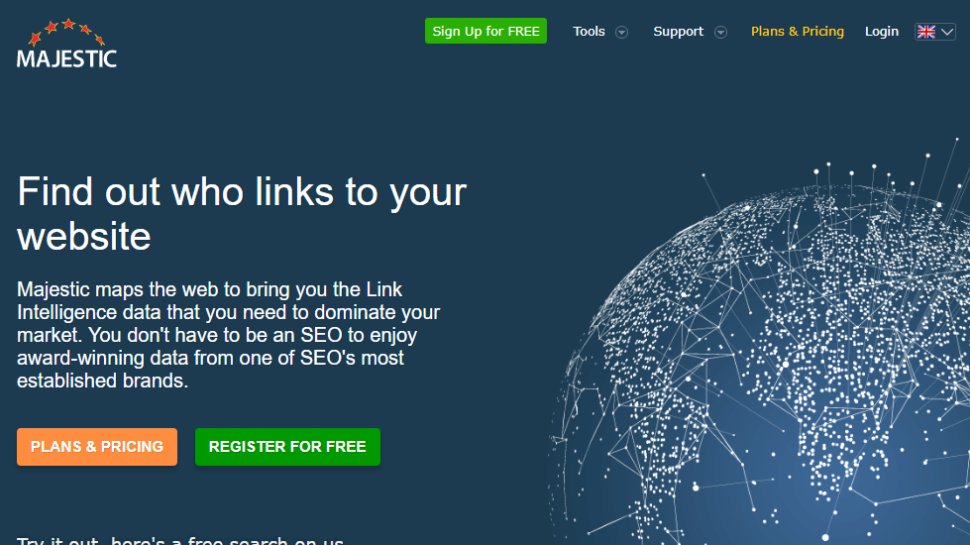
4. Majestic SEO Tools
A royal offering for all backlink tinkerers
Majestic SEO tools has consistently received praise from SEO veterans since its inception in 2011. This also makes it one of the oldest SEO tools available today.
The tools main focus is on backlinks, which represent links between one website and another. This has a significant influence on SEO performance and as such, Majestic has a huge amount of backlink data.
Users can search both a 'Fresh Index' which is crawled and updated throughout the day, in addition to an 'Historic Index' which has been praised online for its lightning retrieval speed. One of the most popular features is the 'Majestic Million' which displays a ranking of the top 1 million websites.
The 'Lite' version of Majestic costs $50 per month and incorporates useful features such as a bulk backlink checker, a record of referring domains, IP's and subnets as well as Majestic's integrated 'Site Explorer'. This feature which is designed to give you an overview of your online store has received some negative comments due to looking a little dated. Majestic also has no Google Analytics integration.
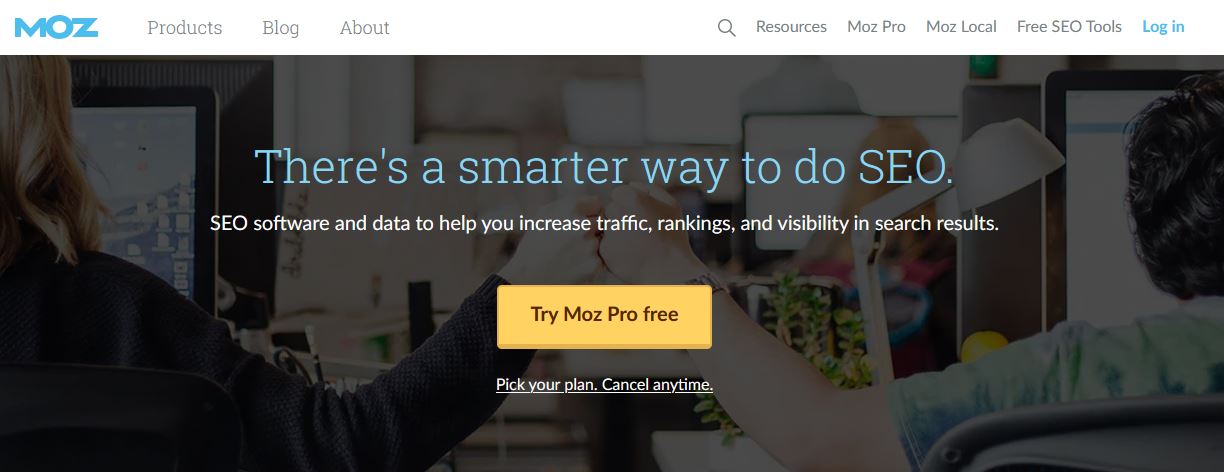
5. Moz Pro
Community supported search marketing tools
Moz Pro is a platform of SEO tools that aim to help you increase traffic, rankings, and visibility across search engine results.
Key tools include the ability to audit your own site using the Moz Pro spider, which should highlight potential issues and recommend actionable insights. There's also the ability to track your site rankings over hundreds or even thousands of keywords per website.
There's also a keyword research tool to help determine which keywords and keyword combinations may be the best for targeting, and there's also a backlink analysis tool that mixes a combination of metrics including anchor text in links as well as estimated domain authority.
Pricing for Moz Pro begins at $99 per month for the Standard plan which covers the basic tools. The Medium plan offers a wider range of features for $149 per month and a free trial is available. Note that plans come with a 20% discount if paid for annually. Additional plans are available for agency and enterprise needs, and there are additional paid-for tools for local listings and STAT data analysis.
Even if you don't sign up to Moz Pro, a number of free tools are available. There's also a huge supporting community ready to offer help, advice, and guidance across the breadth of search marketing issues.
Best free SEO tools
Although we've highlighted the best paid-for SEO tools out there, a number of websites offer more limited tools that are free to use. Here we'll look at the free options.
1. SEOQuake
SEOquake is one of the most popular toolbar extension. It allows you to view multiple search engine parameters on the fly and save and compare them with the results obtained for other projects. Although the icons and numbers that SEOquake yields might be unintelligible to the uninformed user, skilled optimizers will appreciate the wealth of detail this add-on provides.
Gauge details about number of visitors and their country, get a site's traffic history trended on a graph, and more. The toolbar includes buttons for a site's Google index update, backlinks, SEMRush ranking, Facebook likes, Bing index, Alexa ranks, web archive age and a link to the Whois page. There’s also a useful cheat sheet and diagnostics page to have a bird’s view of potential issues (or opportunities) affecting a particular page or site.
2. Google AdWords keyword planner
Knowing the right keywords to target is all-important when priming your web copy. Google's free keyword tool, part of Adwords, couldn't be easier to use. Plug your website URL into the box, start reviewing the suggested keywords and off you go. Jill Whalen, CEO of HighRankings.com is a fan and offers advice to those new to keyword optimization: "make sure you use those keywords within the content of your website."
However, while useful for keyword research purposes it's important to realize the numbers provided are approximations rather than exact figures, and intended to provide a guide to popularity rather than exact real-time search volume.
3. Google Optimize
Yet another Google tool on that list (not a surprise isn’t it). Optimize is not for the faint hearted and will make even seasoned SEO experts uncomfortable. SEO isn't all about rankings and without the right balance of content that engages with your visitors and drives conversions, you're earnest optimization could be wasted.
Google’s free service helps take the guesswork out of the game, allowing you to test your site's content: from simple A/B testing of two different pages to comparing a whole combination of elements on any given page. Personalization features are also available to spice things up a bit. Note that in order to run some of the more complicated multivariate testing, you will need adequate traffic and time to make the results actionable, just as you do with Analytics.
4. Ahrefs Backlink Checker
Understanding backlinks (sites linking to you) allows website owners and publishers to see what link opportunities they might be missing out on. Enter Ahrefs, arguably one of the most powerful players out there.
They maintain one of the largest live backlink indexes currently available with over 17 trillion known links, covering 170 million root domains. While Ahrefs isn't free, the backlink checker feature is, which provides a useful snapshot that includes your domain rating, the top 100 backlinks, top 5 anchors and top 5 pages, the strict minimum to provide with a feel of what Ahrefs has to offer.
What is an SEO crawler?
An SEO crawler can help you discover and fix issues that are preventing search engines from accessing and crawling your site. It remains an essential yet elusive tool in the arsenal of any good SEO expert. We caught up with Julia Nesterets, the founder of SEO crawler Jetoctopus to understand what exactly an SEO crawler and why is it so important.
If you are a webmaster or SEO professional, this is probably the most heartbreaking message you may receive. Sometimes Google’s bots may ignore your content and SEO efforts and avoid indexing your page. But the good news is that you can fix this issue!
Search engines were designed to crawl, understand, and organize online content to deliver the best and most relevant results to users. Anything getting in the way of this process can negatively affect a website’s online visibility. Therefore, making your website crawlable is one the primary goals and can highlight any issues you have with your web hosting service provider.
By improving your site’s crawlability you can help search engine bots understand what your pages are about and by that leverage your Google ranking. So how can an SEO crawler help?
1. It offers real-time feedback. An SEO crawler can quickly crawl your website (some crawls as fast as 200 pages per second) to show any issues it gives. The reports analyzes the URL, site architecture, HTTP status code, broken links, details of redirect chains and meta robots, rel-canonical URLs, and other SEO issues. These reports can be easily exported and referred to for further action by the technical SEO and development teams. Thus, using an SEO crawler is the best way to ensure your team is up to date on your website crawling status.
2. It identifies indexing errors early. Indexing errors like 404 errors, duplicate title tags, duplicate meta descriptions, and duplicate content, often go unnoticed as they aren’t easy to locate. Using an SEO crawler can help you spot such issues during routine SEO audits, allowing you to avoid bigger problems in the future.
3. It tells you where to start! Deriving insights from all available reports may be intimidating for any SEO professional. Therefore, it’s wise to choose an SEO crawler which is problem-centric and helps you prioritize issues. A good crawler should make it possible for webmasters to concentrate on the main problems by estimating their scale. That way, webmasters can keep fixing critical issues in a timely manner.
What is a crawl budget?
Julia Nesterets, the founder of SEO crawler Jetoctopus, introduced us to the concept of a crawl budget. We wanted to find out what it is and why it is such an important subject especially if you're a big website.
Google's bots are usually busy and occupied with trying to access millions of web pages. In fact, the entire SEO domain is on its toes to crave attention from crawlers. SEO specialists want bots to crawl as many of their web pages as possible, to ensure more and more pages are indexed and ranked.
But the web is a vast and massive universe of pages and other online assets like JavaScript and CSS files and mobile page variants etc. Hence, it’s next to impossible for search engine bots to crawl and index everything. At the same time, search engines need to keep their indexes updated to include all the important content.
Search engines do not enjoy unlimited resources; hence, they need to prioritize their crawling efforts. They need to determine -
● How to prioritize some web pages over the other
● What content to crawl (and what to ignore)
● Whether to recrawl certain pages often or never go back to them
These factors define the way search engines access and index online content. That’s where crawl budget and its optimization come into play.
Crawl budget is the number of pages the bots crawl and index within a given time frame. If search engines fail to crawl your page, it won’t get ranked in the SERPs. Which is to say, if the number of web pages exceeds your crawl budget, you’ll have more pages that aren’t crawled and indexed.
Assigning a crawl budget helps search bots crawl your website efficiently and therefore, boosting your SEO efforts. It’s the search engine’s way to divide attention among the millions of pages available on the web.
Thus, crawl budget optimization can ensure that the most critical content on your site is crawled and indexed.
Several factors like low-value URLs, broken or redirected links, duplicate content, wrong indexation management issues, broken pages, site speed issues, hreflang tag issues, and overuse of AMP pages, among others, can affect your crawl budget. Managing these factors will help users and crawlers access your most critical content easily and save the crawl budget from going to waste.
Besides, it’s critical to monitor how the crawlers visit your site and access content on it. Google Search Console can offer you useful information on your site’s stance in the index and the search performance. You will also find a Crawl Stats report in the Legacy tools section that shows the bot’s activity on your site over the past 90 days.
Also, server log file analysis can tell you exactly when the crawlers visit your site and the pages they visit often. Automated SEO crawlers and log analyzers can comb through your log files to find broken links and errors that bots have encountered when crawling your site. Further, the tool can audit your redirects and optimize your crawl budget to ensure that the bots crawl and index as many important pages as possible.
Wasting or failing to optimize your crawl budget equates to hurting your SEO performance. Pay special attention to crawl budget if:
● You own a huge website (especially an ecommerce site with 10K+ pages)
● You just added new content or web pages
● Your site has many redirects and redirect chains (as they eat the crawl budget)
Can adverts impact your SEO negatively?
When you think of SEO, you generally don’t think of ads, and with good reason. Eric Hochberger, Co-Founder and CEO of full service ad management company Mediavine, explains to us the love-hate relationship between these two entities.
By definition, advertising runs counter to the goals of SEO optimization, a process which relies on publisher content and user experience. However, as an ad management company that originated as an SEO marketing firm, we work to find the perfect balance, ensuring the two can coexist. Yes, you can run high-performing ads and still rank well in search engines thanks to the right ad tech. It’s not an either-or scenario, and here’s why:
The first key feature is lazy loading. When a website employs lazy loading, ads only load on a webpage as a user scrolls to them. Meaning, if a user doesn’t scroll to a certain screen view, the ads don’t exist on the page. This function extremely lightens the page load. A lighter page means faster loading which leads to better SEO.
Complying with the Coalition for Better Ads (CBA) standards is critical to SEO because the CBA is what Google uses to power its built-in Chrome Ad Filtering and its Ad Experience Report in Google Search Console (its main SEO tool). There’s a misconception that the number of ads affects SEO, but it’s actually the density. The CBA provides comprehensive insight regarding appropriate ad-to-content ratios for both mobile and desktop.
Lastly, reducing above the fold (ATF) ads, or ads that appear in the first screen view, is huge for both page speed and SEO. If an ad isn’t loading in the first screen view, the site will appear to load faster (how Google measures it), since users don’t notice when an ad loads if it’s below the fold.
Which leads me to this - you’ll often hear that SEO follows user experience. Google uses this line quite a bit, which makes sense. Ultimately, the goal of Google search results is to return the best user experience. If ads are bogging down a website, that doesn’t equal a high-quality user experience, which therefore will not generate good SEO. Do you see the pattern here?
While there is an ability for SEO and advertisements to coexist in a positive way, the existing resources for publishers to promote this are scarce. The solution would be to get a framework that works on the most popular CMS and focuses on Google’s best practices from Core Web Vitals to page experience and employs lazy loading and reducing ads ATF.
- Check out the best free website hosting services
from TechRadar - All the latest technology news https://ift.tt/3d4w2WQ
via IFTTT










COMMENTS